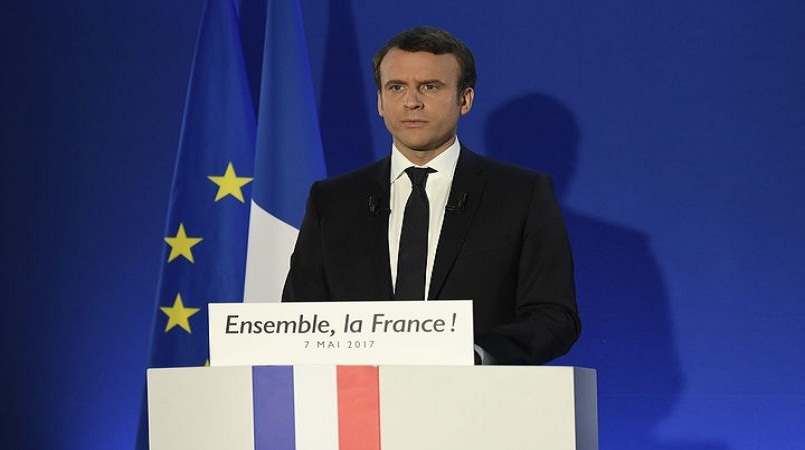
Centrist candidate Emmanuel Macron has decisively won the French presidential election, projected results say.
Mr Macron defeated far-right candidate Marine Le Pen by about 65 percent to 35 percent to become, at 39, the country's youngest president, the results showed.
He will also become the first president from outside the two traditional main parties since the modern republic's foundation in 1958.
He said a "new chapter of hope and confidence is opening".
Turnout is sharply down on the last election with just 65 percent voting, while 72 percent voted in the last election in 2012, and there are predictions the election could have the highest abstention rate in 50 years.
Ms Le Pen, 48, has conceded defeat and congratulated Mr Macron on his win. Shortly after the first projections were published she said she had congratulated her opponent.
Legislative elections will follow quickly 11 and 18 June. En Marche will contest the elections as a party but Mr Macron may find himself needing to pull together a coalition to govern effectively.
Although his presidential candidacy had support from other political parties, much of it stemmed from the need to defeat Ms Le Pen.
He will need to win over the abstainers and those who are sceptical about his political vision. Left-wing voters in particular felt disenfranchised by the choice of the final two candidates.
In a speech Ms Le Pen thanked the 11 million people who had voted for her. She said the election had shown a division between "patriots and globalists" and called for the emergence of a new political force.
Ms Le Pen said her National Front party needed to renew itself and that she would start the "deep transformation of our movement", vowing to lead it into upcoming parliamentary elections.
She also said she had wished Mr Macron success in tackling the "huge challenges" facing him.
President François Hollande congratulated Mr Macron and said the result showed the French people wanted to unite around the "values of the republic".
Mr Macron's supporters gathered in the grounds of the Louvre in central Paris, while Ms Le Pen's were in Vincennes, just outside the capital.
A poll published on Friday suggested that the head of the IMF and former Economy Minister, Christine Lagarde, would be the most popular choice for prime minister.
Some analysts believe she is a good option for Mr Macron because, while she has experience of ministerial office, she has never actually been elected and so may qualify as part of his political renewal.
The BBC's Hugh Schofield in Paris said this was the most remarkable success story of how a man who three years ago was utterly unknown to the French public, through sheer self-belief, energy - and connections - forged a political movement that has trounced all the established French political parties.
Mr Macron is a liberal centrist, pro-business and a strong supporter of the European Union.
He left the ruling Socialist Party of François Hollande last August to form his new movement - En Marche - saying it was neither left nor right wing.
His campaign pledges included a 120,000 reduction in public-sector jobs, a cut in public spending by €60bn, and a lowering of the unemployment rate to below 7 percent.
He vowed to ease labour laws and give new protections to the self-employed. He has promised fresh faces from outside politics, an overhaul of the established political system and a new kind morality in political life.
Mr Macron also stood on a pro-EU platform, in stark contrast to his opponent.
His En Marche! (English: On The Move! or Onwards!) movement has the feel of a start-up, with the average age said to be around 30. But he is also going to need experience, particularly in areas such as security.
"The young technocrats that surround Macron are impatient for their go," says Pierre Haski, former deputy editor at the left-wing newspaper Libération.
"They think the oldies have made a mess of things… [but] Emmanuel Macron needs to find a balance between the traditional big beasts of the main parties and the newcomers. It can't just be the younger generation.
Photo: AFP Emmanuel Macron delivers a speech at his campaign headquarters in Paris after the second round of the French presidential election.
